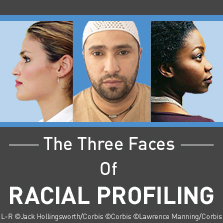Three Faces of Racial Profiling: The Unfinished Business of the Civil Rights Movement


Imagine that someone assumes that you are a criminal based on your race, religion or ethnicity and treats you like one. Take the case of the Latino students at Hoover High School in Los Angeles who were rounded up during lunch, detained for two hours, frisked and interrogated about gang affiliations by Glendale and Los Angeles police officers, despite no evidence of wrong doing.
Or the highly decorated U.S. Army Sgt. Rossano Gerald, a black man of Panamanian descent, who found that he could not drive more than 30 minutes across the state of Oklahoma without being stopped by the state troopers. During one of the stops, the police terrorized Gerald's 12-year-old son with a police dog, separated them, sat them in chokingly hot cars and turned off their video cameras so that their misconduct could not be uncovered.
Or the group of Asian American youth in Seattle Washington who were singled out and detained on a street corner by a police officer for 45 minutes on an allegation of jaywalking while white pedestrians crossing the street in the same manner were not stopped.
Fifty years after the march on Washington, racial profiling still remains.
Racial profiling is the practice of using a person's race, color, ethnicity or national origin to determine whether to stop, search or investigate him or her for alleged criminal activity. But not only does racial profiling incite feelings of helplessness, frustration, anxiety and anger for innocent victims of the practice – it does not work as a law enforcement tool.
Rather, it undermines the trust between local police and the communities they are to protect. It also takes away valuable resources that would be better spent actually fighting crime.
This past weekend thousands gathered from across the nation to dedicate a memorial in honor of Martin Luther King, Jr.'s life and legacy. The best way we could honor King, however, is to put the principles of equal justice under the law that he lived and died for into practice.
Many people believe that we live a post-racial society, in which people are no longer judged by their skin color the way they were in King's time. But Sgt. Gerald was an infant when King gave his "I Have a Dream Speech," and despite the progress we have made since then, he was still a victim of racial profiling and discrimination.
This is why the ACLU supports the End Racial Profiling Act that prohibits racial profiling by federal, state and local law enforcement officers and permits people to take legal action if they feel their rights have been violated.
As Martin Luther King Jr. said, almost fifty years ago, "NOW is the time to lift our national policy from the quicksand of racial injustice to the solid rock of human dignity."
If you are in the Washington, D.C. — area please join the ACLU for our "Three Faces of Racial Profiling" policy discussion on Thurs., Oct. 27, 2011 at 10 a.m.
Learn more about racial profiling: Sign up for breaking news alerts, follow us on Twitter, and like us on Facebook.

